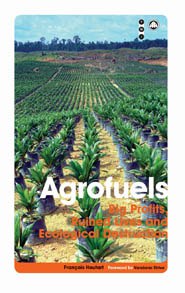African farmers risk being forced from their lands by investors or government projects as global demand for biofuels encourages changes in crop cultivation.
http://www.sciencedaily.com/releases/2010/04/100422093534.htm
See also the book
Agrofuels
Big Profits, Ruined Lives and Ecological Destruction
http://www.plutobooks.com/display.asp?K=9780745330129&
Product Description
Since they were heralded as a key weapon in the fight against climate change, agrofuels have been criticised heavily for doing more harm than good due to deforestation and stealing agricultural land essential to farmers in the developing world. This book asks whether there is any place for agrofuels in a low-carbon future.
François Houtart argues that the green potential of agrofuels has been wasted by businesses that put profits above environmental protection. This has led to the absurd situation where an energy source that should be sustainable actually increases human and ecological damage, simply due to the profit-maximising decisions of capitalists rather than a flaw in the concept of agrofuels.
Students of development studies and environmental economics will find that this book offers an interesting new perspective on the future of energy.


Comments
In the 1970s algae was found to be the most efficient biofuel
Hello I'm a botanist . . .
I see their is oil palms growing there in the picture, the west african oil palm was only discovered over 100 years ago, only in the 1930s was it suggested that they could be grown quite well in south east asia & other places around the world.
In the 1970's algae was found to be the the most efficient biofuel
http://indymedia.org.au/2012/09/09/algae-humanitys-saviour